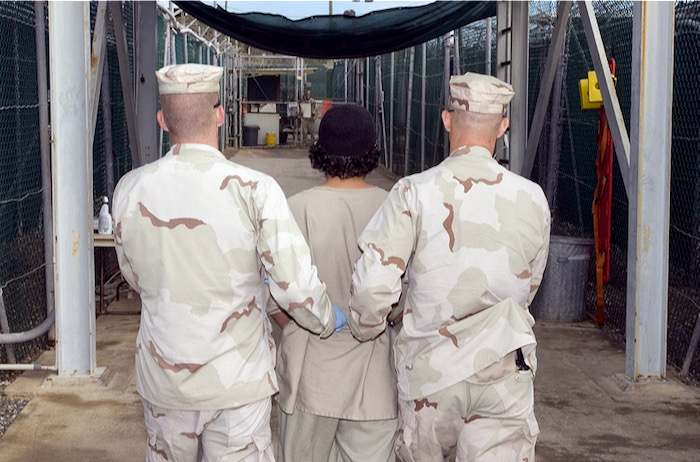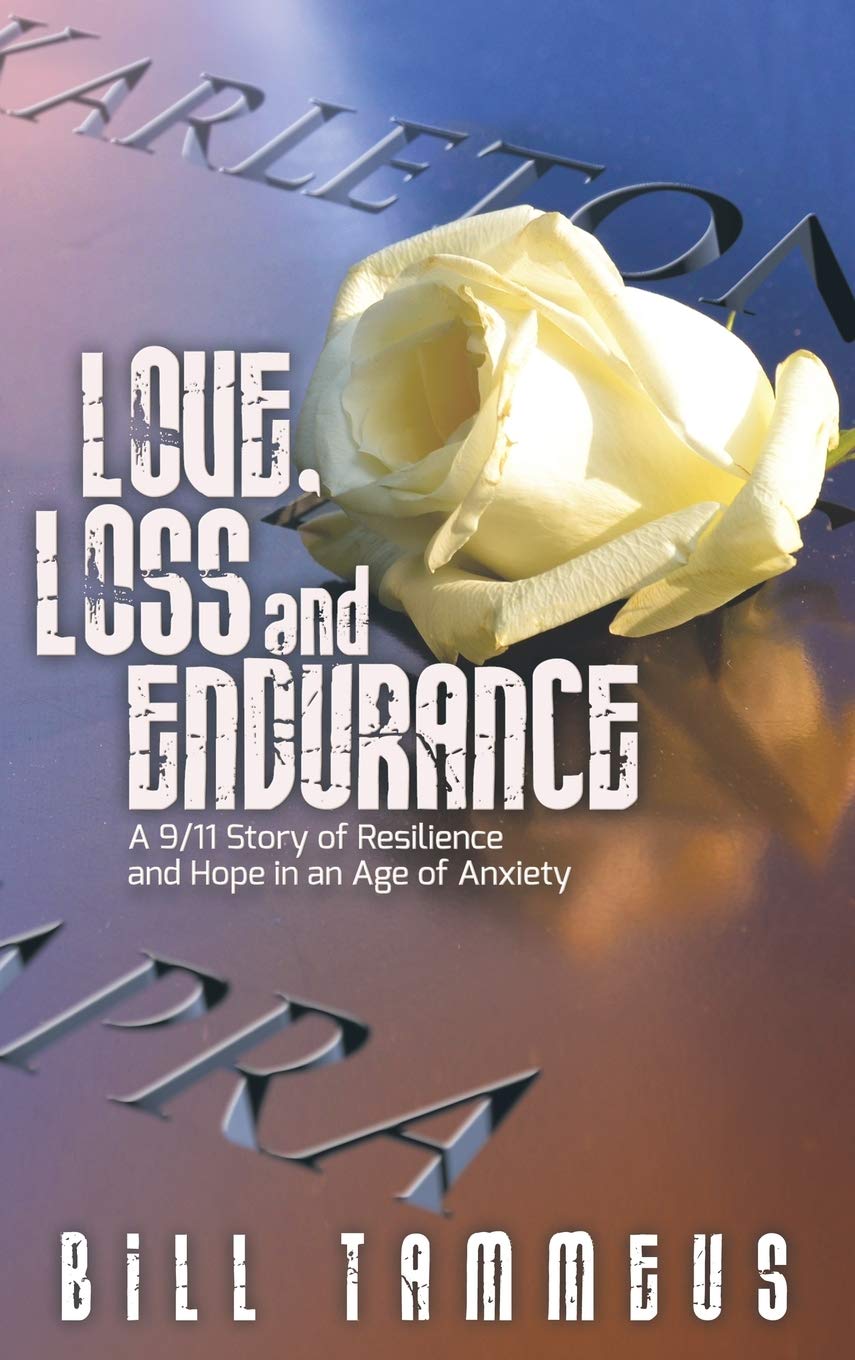
A detainee at the Guantanamo Bay detention camp under military escort between facilities. Photo courtesy of Wikimedia Commons.
.
News of American torture prompts fresh opposition
EDITOR’s NOTE: Since our publishing house was founded in 2007, many of our authors and columnists have written about their commitments toward world peace. The first author we published is international peace trainer Daniel Buttry, whose books include Blessed Are the Peacemakers. As a community of writers, we have pursued these themes for 14 years. Flash forward to 2021, and we have just published David Edwards’ What Belongs to God: Reflections on Peacemaking by a Conscientious Objector and Bill Tammeus’ Love, Loss and Endurance: A 9/11 Story of Resilience and Hope in an Age of Anxiety. For many years, Bill also has been one of the leading American journalists covering religion, and writing commentaries about the complex interrelationship between faith and culture. When news broke in the case of detainee Majid Kahn this week, Bill reported the following column for our readers.
.
Beyond Moral Outrage, Torture Is Counterproductive
By BILL TAMMEUS
Contributing Columnist
It’s not as if we Americans are just discovering that some agencies of our government have tortured people physically, mentally and emotionally.
After all, we read about it in sickening detail when it happened at the Abu Ghraib prison at the start of the war in Iraq. And we’ve heard about torture (euphemistically called “enhanced interrogation techniques”) used on captured planners of the 9/11 terrorist attacks and others. (Here’s a recent report from Human Rights Watch.) There’s a description of all that in a 2014 report of the Senate Select Committee on Intelligence. The full report runs more than 6,700 pages with enough sordid details to make you vomit.
That report said that its “major lesson” was “that regardless of the pressures and the need to act, the Intelligence Community’s actions must always reflect who we are as a nation, and adhere to our laws and standards. It is precisely at these times of national crisis that our government must be guided by the lessons of our history and subject decisions to internal and external review. Instead, CIA personnel, aided by two outside contractors, decided to initiate a program of indefinite secret detention and the use of brutal interrogation techniques in violation of U.S. law, treaty obligations, and our values.”

Click on this link to learn more about the religious organizations that have become members of the National Religious Campaign Against Torture.
All of this and more is why such organizations as the National Religious Campaign Against Torture exist. Somebody, after all, has to say no to these outrages.
Despite knowing all that and more, I still found the recent testimony given—finally—by a Guantanamo Bay prisoner (who has confessed to his crimes and expressed remorse) appalling in its detailed account of suffering. As the Associated Press reported, “Majid Khan, a former resident of the Baltimore suburbs who became an al-Qaida courier, told jurors considering his sentence for war crimes how he was subjected to days of painful abuse in the clandestine CIA facilities known as ‘black sites,’ as interrogators pressed him for information.”
Khan’s summary of his experience: “I thought I was going to die.”
The AP described the man’s testimony this way: “Khan spoke of being suspended naked from a ceiling beam for long periods, doused repeatedly with ice water to keep him awake for days. He described having his head held under water to the point of near drowning, only to have water poured into his nose and mouth when the interrogators let him up. He was beaten, given forced enemas, sexually assaulted and starved in overseas prisons whose locations were not disclosed.”
What all of this proved again is what we already should have known—countering extremism with extremism not only doesn’t work, it also morally compromises the people who use ugly, brutal force to get answers. Such people dehumanize themselves.
More than that, torture gives live ammunition to people who seek evidence that justifies their loathing of the United States.

Click on this visual-link to see the two-page, handwritten Majid Khan clemency letter as reproduced in the New York Times.
Seven of the eight jurors who heard Khan’s testimony almost immediately signed a handwritten letter demanding clemency for him because of the abominable treatment he received.
They wrote this: “Mr. Khan was subjected to physical and psychological abuse well beyond approved enhanced interrogation techniques, instead being closer to torture performed by the most abusive regimes in modern history. This abuse was of no practical value in terms of intelligence, or any other tangible benefit to U.S. interests. Instead, it is a stain on the moral fiber of America; the treatment of Mr. Khan in the hands of U.S. personnel should be a source of shame for the U.S. government.”
I am not naïve. I know there are bad actors who wish to do me and others harm.
Some of them did exactly that to me and my family on 9/11 when they murdered my nephew, Karleton Fyfe, a passenger on the first plane to crash into the World Trade Center.
But I also know that the way to unplug extremism is not by using more of it. We must find other means, whether we’re talking about individuals, groups, political parties or governments. Sometimes, indeed, it’s individuals who can teach governments how to behave morally.
So as a first step toward that end, I devoted the last chapter of my new book, Love, Loss and Endurance, to offering suggestions for how to counter radicalism, whether it’s rooted in religion, geopolitics, white supremacy or something else.
My list is not the final word on this. Rather, it’s simply one person’s hopeful start at the task of defusing fanatical rhetoric and actions. My guess is that each of you could add more ideas to help, and I hope you will.
Of the eight ideas included in my book, I will highlight just three here:
- Engage in interfaith dialogue and cooperation. The idea isn’t to work for the mashing together of different religions into one broad syncretistic mess of a religion. Rather, the idea is for people of different faith traditions to know and to be known. It’s to understand the many different approaches to religion that people of goodwill adopt, an understanding that should lead to a bit of humility about whether our own choices are also God’s direction for everyone else.
- Deepen your knowledge of both American and world history. A fair amount of global terrorism is tied to the shockwaves that have radiated across the nation and around the globe from historical events about which many people, especially Americans, seem to know little or nothing. That’s particularly true about geopolitical and religious history in developing nations, including parts of the Middle East.
- Spend time with people who have experienced profound grief. This is the emotional equivalent of walking a mile in someone else’s shoes. It can open our eyes to the countless ways that death — particularly unexpected, violent death — can affect almost every aspect of the lives of survivors. You may not know personally anyone who has lost family members on 9/11 or in terrorist attacks on other dates around the globe, but there are lots of surviving family members of those who died in attacks in El Paso, Pittsburgh, Poway, Charleston, Kansas City and on and on. If there’s an opportunity, meet some of them. Talk with them, if they’re willing to do that, but only if they’re willing. Let them tell you their story.
American officials have violated a long list of moral standards in their treatment of people rounded up after 9/11. By doing that, they created more excuses for people to want to harm our nation and its citizens.
We must say clearly and loudly that what those officials did was wrong and that their actions don’t represent core American values. Sometimes the most patriotic thing we citizens can do is to criticize our own country.
.
Care to Read More?
IN JANUARY, Bill also wrote the following for USA Today:
.
Bill Tammeus, a former award-winning columnist for The Kansas City Star, writes the “Faith Matters” blog for The Star’s website and columns for The Presbyterian Outlook and formerly for The National Catholic Reporter. His latest book is Love, Loss and Endurance: A 9/11 Story of Resilience and Hope in an Age of Anxiety. Email him at [email protected].





Excellent column which I can only hope every American and others around the world will read.
Also it seems only Frontline does this kind of in depth reporting for our Television world.
As a free nation of ideas, we are being kept in the dark, missing those reports which do not
fit in with the incessant comercials
Thanks for your comment. Much appreciated.
This is the truth Bill is telling us and if we re-tell it enough it will set us free. If we don’t we will suffer a spiritual loss as great as any physical pain we inflict. Duncan Newcomer
Thanks for writing this, Duncan. You’re right.